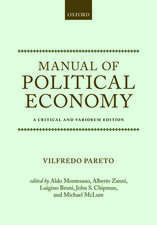The Balkan Economies c.1800–1914: Evolution without Development: Cambridge Studies in Modern Economic History, cartea 6
Autor Michael R. Palaireten Limba Engleză Paperback – 12 noi 2003
| Toate formatele și edițiile | Preț | Express |
|---|---|---|
| Paperback (1) | 277.54 lei 6-8 săpt. | |
| Cambridge University Press – 12 noi 2003 | 277.54 lei 6-8 săpt. | |
| Hardback (1) | 902.71 lei 6-8 săpt. | |
| Cambridge University Press – 10 dec 1997 | 902.71 lei 6-8 săpt. |
Preț: 277.54 lei
Nou
Puncte Express: 416
Preț estimativ în valută:
53.11€ • 54.87$ • 44.20£
53.11€ • 54.87$ • 44.20£
Carte tipărită la comandă
Livrare economică 26 martie-09 aprilie
Preluare comenzi: 021 569.72.76
Specificații
ISBN-13: 9780521522564
ISBN-10: 0521522560
Pagini: 432
Ilustrații: 5 b/w illus. 6 maps 46 tables
Dimensiuni: 152 x 229 x 24 mm
Greutate: 0.63 kg
Ediția:Revised
Editura: Cambridge University Press
Colecția Cambridge University Press
Seria Cambridge Studies in Modern Economic History
Locul publicării:Cambridge, United Kingdom
ISBN-10: 0521522560
Pagini: 432
Ilustrații: 5 b/w illus. 6 maps 46 tables
Dimensiuni: 152 x 229 x 24 mm
Greutate: 0.63 kg
Ediția:Revised
Editura: Cambridge University Press
Colecția Cambridge University Press
Seria Cambridge Studies in Modern Economic History
Locul publicării:Cambridge, United Kingdom
Cuprins
List of Tables; Preface; Part I. The Balkan Economies during the Ottoman Period to 1878: 1. Balkan population 1790–1914; 2. The Balkans under the Ottomans 1800–1860s: institutional change and economic progress; 3. Agriculture and industry in Ottoman Bulgaria in the twilight of Ottoman rule; 4. Serbia 1815–75: institutions, resources and market forces; 5. Bosnia and Montenegro before 1878; 6. The Ottoman Balkans and free Serbia: economic conditions and 'renascence'; Part II. Economic Decline and Political Freedom 1878–1914: 7. Bulgaria after 1878: origins of productive decline; 8. Bosnia and Montenegro: political change and economic development 1878–1914; 9. The Balkan textile industries 1878–1914: markets, technology, labour; 10. Serbia and Bulgaria 1878–1914: modernization and productive decline; 11. Economic change in Macedonia and Thrace 1878–1914; 12. Summary and conclusions; Bibliography.
Recenzii
"Palairet's new Balkan Economies may likely become the most authentic work on the topic." Business History Review
"The author set out to provide an indispensable economic history for all scholars interested in the history of the Balkans and he is to be congratulated for successfully reaching his goal." Charles L. Bertrand, Canadian Journal of History
"[Michael Palairet's] book, closely argued and documented from rarely tapped national archives and an immense range of contemporary and recent writings, is both a contribution to comparative economic history and a refutation of the hitherto widely accepted perception that, after 1878, Balkan-Slav economic growth was `slow, faltering but still significant'(p. 1)." Michael Kaser, International History Review
"Among the strengths revealed in this book is the author's ability to combine attention to detail with a broad comparative sweep...At its best, text and illustration come together to illuminate buildings as the embodiment of "competing visions" of aesthetic and social formation." Slavic Rreview
"...a controversial and immensely stimulating piece of scholarship." David F. Good, Journal of Modern History
"The author set out to provide an indispensable economic history for all scholars interested in the history of the Balkans and he is to be congratulated for successfully reaching his goal." Charles L. Bertrand, Canadian Journal of History
"[Michael Palairet's] book, closely argued and documented from rarely tapped national archives and an immense range of contemporary and recent writings, is both a contribution to comparative economic history and a refutation of the hitherto widely accepted perception that, after 1878, Balkan-Slav economic growth was `slow, faltering but still significant'(p. 1)." Michael Kaser, International History Review
"Among the strengths revealed in this book is the author's ability to combine attention to detail with a broad comparative sweep...At its best, text and illustration come together to illuminate buildings as the embodiment of "competing visions" of aesthetic and social formation." Slavic Rreview
"...a controversial and immensely stimulating piece of scholarship." David F. Good, Journal of Modern History
Descriere
A definitive economic history of the Balkans, making extensive use of native-language primary sources, first published in 1997.



























